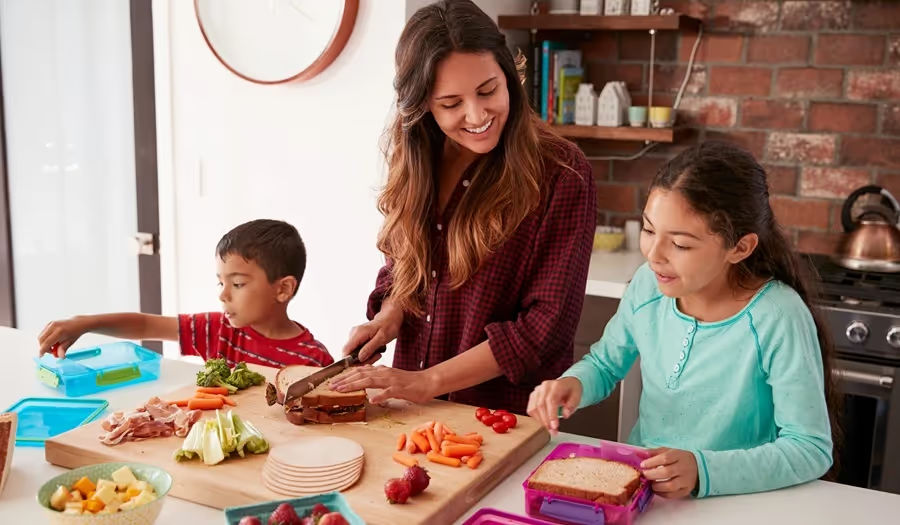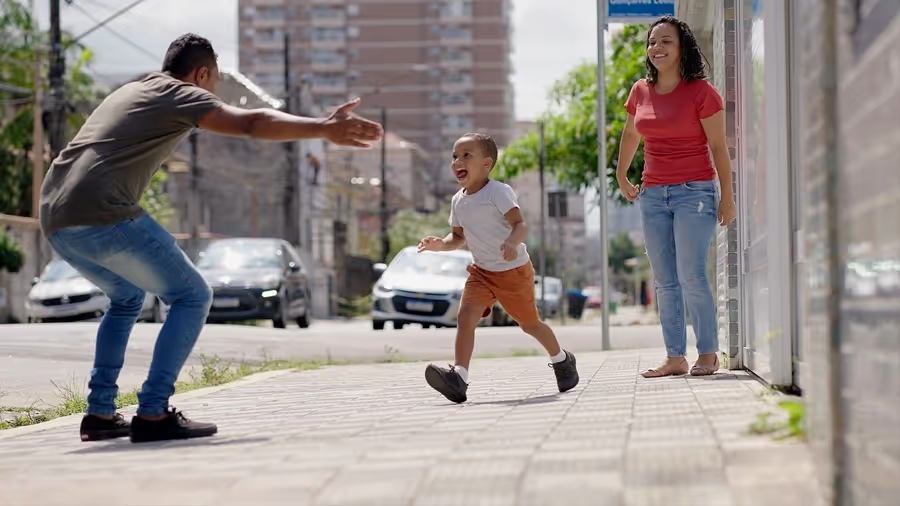The emotional weight and legal complexities of a child custody dispute in California can feel overwhelming. Fortunately, you don’t have to face them alone.
At Hopper Hopper & Strebe, we take a client-centered approach, offering personalized legal representation tailored to your unique situation. Our child custody attorneys boast extensive experience in family law, with a particular focus on high-conflict cases, domestic violence matters, and protecting family assets.
This guide will provide practical strategies and insights to help you achieve the best possible outcome for your child.
Understanding California's Approach to Child Custody
In custody determinations, California courts prioritize the "best interests of the child" above all else. This isn't a simple formula — it demands a comprehensive evaluation of conditions that extend far beyond financial stability, including the intricate dynamics of family life and child welfare.
Judges consider numerous factors when determining the best course of action for the child in custody cases. This section highlights several key elements that significantly influence custody decisions in California, empowering you to build a stronger case.
The Child's Health, Safety, and Well-Being
The well-being of the child is paramount. Any situation that potentially endangers a child (domestic violence, substance abuse, neglect, parental alienation, etc.) will impact the court's decision. Judges prioritize the child's physical and emotional safety in every instance.
Detailed documentation of abuse and related risks, such as police reports, medical records, and witness statements, is critical in these cases. Evidence of rehabilitation efforts can sometimes improve the negative perception of a parent seeking custody.
If one parent actively tries to turn the child against the other, it's a serious issue. Judges actively seek to protect children from this kind of damaging behavior. Evidence of parental alienation frequently has a bearing on custody decisions. Documentation showing attempts at alienation can be very impactful.

The Parents’ Caregiving History and Ability to Meet the Child’s Needs
Judges examine each parent's history of providing care with the intent to assess their emotional, physical, and financial capacity to meet the child's needs. Consistent care, active involvement in the child's life (school, healthcare, extracurricular activities, etc.), and demonstrable financial stability are all positive factors.
The Child's Connection to Their Community
Stability and routine are essential for the development of children. Disrupting a child's established connection to their school, friends, or community activities is therefore a major concern. Efforts to maintain these ties are a strong indicator of parental stability.
The Child's Preference
While not necessarily determinative, the child's expressed preference carries some weight, especially if they’re mature enough to articulate their views thoughtfully. (The child’s wishes are typically given more consideration if they’re 14 or older.) The court will explore the reasons behind the preference to ensure that it isn’t the result of manipulation or coercion.
Carefully Devised Parenting Plans
Courts favor detailed, well-thought-out parenting plans. Such a plan should outline specific visitation schedules, decision-making responsibilities, communication protocols, and dispute-resolution mechanisms between the parents. Plans that demonstrate cooperation and mutual respect are most likely to be approved.

Exploring the Various Types of Child Custody Orders
Understanding the different types of child custody orders in California is an important aspect of managing a custody case effectively. California law recognizes a variety of arrangements, each designed to address the unique needs of families and, most importantly, serve the child's best interests.
Legal Custody (Decision-Making)
This aspect of custody determines which parent(s) have the authority to make significant decisions regarding the child's upbringing. These decisions include but aren't limited to education, healthcare, and religious instruction.
Legal custody can be awarded as:
Joint Legal Custody
Both parents share the responsibility for making decisions. This often requires considerable cooperation and communication between the parents. Disputes are typically resolved through collaborative efforts or court intervention.
Sole Legal Custody
One parent retains the sole authority to make major decisions. This arrangement is often ordered when one parent demonstrates a much greater capacity for responsible decision-making or when there are concerns about the other parent's fitness.

Physical Custody (Residence)
Physical custody arrangements determine where the child primarily lives, with a focus on the child's residence and daily routines. They include the following:
Joint Physical Custody
The child's time is divided between the parents' homes, often following a detailed schedule. This arrangement requires ongoing cooperation to ensure smooth transitions and consistency for the child. The specific schedule is frequently dictated by a court order or a mutually agreed-upon parenting plan.
Sole Physical Custody
The child primarily resides with one parent. The other parent typically has visitation rights, the details of which are outlined in a court order or parenting plan. Sole physical custody is often granted when one parent is deemed a more stable and suitable caregiver or when safety concerns exist.
The best arrangement for your child depends on the specific circumstances. An experienced family law attorney can help you better understand this complex legal process and present the strongest case possible.
How to Win a Child Custody Case in California: Practical Tips
Winning a child custody case requires careful forethought and proactive involvement. While there are never any guarantees in legal matters, a shrewd strategy and the right legal representation can make a world of difference.
This section offers a few tips to help you build a compelling case and improve your chances of a favorable outcome.
Document Your Child's Life Thoroughly
It’s imperative to consistently document your active role as a parent. Keep detailed records of your involvement, including:
- Parenting time: Maintain a calendar of all visits, outings, and time spent with your child. Include dates, times, and descriptions of all activities.
- School and healthcare: Document school events, parent-teacher conferences, and medical appointments, noting any interactions with education or medical professionals.
- Extracurricular activities: Record your participation in sports, music lessons, or other extracurricular programs.
- Major events: Include entries detailing birthdays, holidays, recitals, trips, and other significant events in your child's life.
- Communication records: Preserve all communication with the other parent, including emails, text messages, and any written correspondence.
By taking these steps, you can showcase a consistent dedication to your child's happiness and well-being and furnish concrete evidence to support your claims.
Cultivate a Stable and Nurturing Home Environment
To create a safe, supportive, and child-centered home, focus on providing the following:
- A safe, clean space: Ensure that your home is secure, hygienic, and appropriately furnished. Address any safety hazards and maintain a well-organized environment.
- Consistent routines: Establish predictable routines for meals, bedtime, homework, and other daily activities to give your child much-needed stability and structure.
- Designated child spaces: Create dedicated areas for play, homework, eating, sleeping, and other activities.
- Emotional support: Offer a loving and supportive environment, freely providing affection, encouragement, and comfort.
It’s also important to address any personal challenges you may be facing, such as substance abuse, mental health concerns, or anger management problems. If you’re dealing with any of these issues, seek professional help and make sure to document your progress and commitment to change.

Maintain Respectful, Constructive Communication with Your Co-Parent
Make an effort to keep all communication with your co-parent courteous, positive, and productive. These tips will help:
- Make use of co-parenting apps: Consider employing a co-parenting app to record relevant communications and schedule exchanges.
- Keep your focus on the child: Make sure necessary discussions stay focused on your child's needs and well-being, and steer clear of personal attacks or arguments.
- Be responsive: Respond to the other parent’s messages and requests promptly and civilly.
- Avoid negativity: Refrain from using negative language about the other parent, especially in front of your child or on social media.
- Engage in active conflict resolution: If disputes arise, explore mediation or other conflict-resolution strategies to find solutions that benefit your child.
If communication between you and the other parent often turns hostile or argumentative, do your best to avoid emotional triggers, instead treating them the way you would a coworker.
Demonstrate Support for Your Child's Relationship with the Other Parent
Unless there are imminent safety concerns, actively supporting your child's relationship with the other parent can be enriching for them as well as for both parents. Here’s how:
- Facilitate communication: Promote regular communication and in-person interactions between your child and the other parent.
- Be flexible: Show flexibility with visitation schedules and other agreements, being willing to compromise and make adjustments where appropriate.
- Offer positive reinforcement: Encourage your child to relate positive experiences they’ve had with the other parent and vice versa.
- Share information: Keep the other parent informed about important developments, such as school projects, medical appointments, and social engagements.
Making a concerted effort to improve your co-parenting relationship demonstrates emotional maturity and a mutual devotion to your child's welfare.

Proactively Address Any Personal Issues
Take steps to resolve any personal issues that could negatively affect your parenting abilities, such as substance abuse, mental health challenges, or legal troubles. You may find the following suggestions useful:
- Seek professional help: If necessary, enroll in therapy, counseling, or substance abuse treatment to get support for your struggles.
- Document your progress: Hold on to all records of your participation in treatment programs, therapy sessions, and any other positive steps you've taken.
- Practice transparency: Be transparent and honest with the court about any personal issues you’re facing and the steps you're taking to overcome them.
Making a good-faith display to the court will reflect your desire and ability to be a responsible parent, even if you have a history of behaviors or issues a judge might deem unfavorable.
Adhere Strictly to Court Orders and Agreements
Be prepared to comply fully and consistently with all court orders and parenting agreements, including those relating to the following:
- Timely child exchanges: Return your child promptly after visitation as agreed upon in the judge’s order or parenting plan.
- Child support: Pay your child support obligations fully and on time.
- Parenting classes: Attend any court-ordered parenting classes or counseling sessions without resistance or unexplained absences.
- Communication: Keep up regular communication with the other parent in the form of phone calls, text messages, or emails, as preferred.
Keep in mind that any violations of your parenting agreement, however minor, will negatively affect your credibility in the court's eyes.
Child custody cases are often complicated, calling for a deep understanding of California family law. A knowledgeable family law attorney can develop comprehensive, actionable strategies to improve your chances of a favorable outcome.

Complex Child Custody Scenarios
Child custody cases involving domestic violence, substance abuse, or LGBTQ+ families present unique challenges that demand careful attention and a nuanced legal framework. Here are a few scenarios that might require the guidance of a trustworthy family law attorney.
Domestic Violence or Substance Abuse
The threat of domestic violence or substance abuse greatly influences child custody decisions. As mentioned, California courts prioritize the child's safety and well-being above all else. Therefore, documenting any instances of abuse or substance misuse is critical.
Essential evidence to gather includes:
- Police reports: Any reports filed with law enforcement detailing incidents of domestic violence or drug arrests.
- Medical records: Documentation from doctors, therapists, or other medical professionals relating to injuries sustained or treatment received for substance abuse.
- Witness statements: Statements from individuals who have witnessed incidents of domestic violence or substance abuse.
- Photographs and videos: Visual evidence depicting physical injuries, property damage, or other signs of abuse.
- Text messages and emails: Electronic communication displaying threatening or abusive behavior, including evidence of substance abuse or efforts to conceal it.
- Financial records: Bank statements or other financial documentation potentially demonstrating misuse of funds related to substance abuse.
- Rehabilitation efforts: Clear steps to address substance abuse or domestic violence issues, such as participation in rehabilitation programs or anger management classes.
Your attorney will play a pivotal role in gathering and presenting this evidence effectively. The skilled family lawyers at Hopper Hopper & Strebe will ensure that all evidence is admissible in court and use it to build a compelling legal argument supporting your position.
LGBTQ+ Families
Child custody cases centered on LGBTQ+ families often involve unique dynamics. While California law emphasizes equal protection and fair treatment, legal precedent and lingering societal biases can sometimes create difficulties.
Possible issues may include:
- Legal recognition of relationships: Ensuring full acknowledgement of same-sex relationships and parental rights under the law.
- Potential bias: Addressing inequitable biases within the court system or among other parties involved in the case.
- The child's well-being: Demonstrating that the proposed custody arrangement is in the child's best interests, irrespective of the parents' sexual orientation or gender identity.
- Evolving case law: Staying abreast of ever-changing legal developments as well as relevant case precedents.
Working with a qualified legal professional with experience in LGBTQ+ family law is key for protecting your rights.
Your attorney will advocate effectively for you and your child and ensure that the court's decision is based on relevant legal precedent and free of bias. In doing so, they can help you navigate the unique characteristics of these cases and push for a fair and just outcome.
Hopper Hopper & Strebe: Dedicated to Your Child’s Best Interests
Winning a custody case means demonstrating a steadfast commitment to your child's well-being and a responsible, grown-up approach to co-parenting. Combined with trustworthy legal representation, the tips and strategies outlined here can improve your chances of securing positive results.
Reach out to our qualified family law attorneys today to set up a free consultation. We proudly serve clients in Sacramento and surrounding Northern California counties.





.avif)
.avif)



